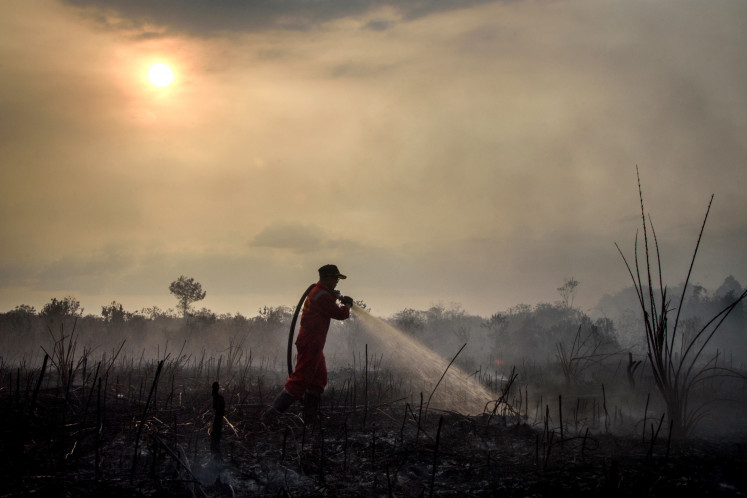Popular Reads
Top Results
Can't find what you're looking for?
View all search resultsPopular Reads
Top Results
Can't find what you're looking for?
View all search resultsASEAN's strategy to handle the rise of China
The rise of China and its potential geopolitical impact on the Asia-Pacific region have triggered discussions on how ASEAN should react
Change text size
Gift Premium Articles
to Anyone
T
he rise of China and its potential geopolitical impact on the Asia-Pacific region have triggered discussions on how ASEAN should react. Thus far, it is still unclear whether a rising China will act responsibly and in accordance with international law, or selfishly in the pursuit of its own interests at the expense of others. The best test of China's behavior will be the South China Sea maritime disputes with several ASEAN countries.
Geopolitics is now more complex with the United States in its 'rebalance' with Asia. This policy, which was initiated during President Barack Obama's first term, assumes that the Asia-Pacific has become more strategically important to the US. The US set up a military base in Darwin, Australia, home to 1,300 US marines, as per a November 2011 agreement between Obama and then prime minister Julia Gillard. Under Prime Minister Tony Abbott, the number is expected to increase to 2,500 in 2016. Another move is the Enhanced Defense Cooperation Agreement (EDCA) between the US and the Philippines, signed April 2014, that will allow US troops to be stationed in the Philippines on a rotational basis.
As a field for contesting interests among major powers, the Asia-Pacific's stability is at stake. The regions of East and Southeast Asia have long benefited from stability to boost their economic development, with the average gross domestic product (GDP) growth rate of 10 percent over the last decade, according to the World Bank. Thus, they cannot allow this stability to evaporate. Furthermore, the stability of the Asia-Pacific is of global concern given its strategic economic role.
According to the International Monetary Fund, in 2011 the Asia-Pacific was home to almost a quarter of the world's GDP. Meanwhile, PricewaterhouseCoopers (PwC) predicted that by 2030, eight of the 25 top world trade routes will be in the Asia-Pacific. By 2012, APEC economies comprised approximately 57 percent of world GDP and 47 percent of world trade. Given its strategic significance, instability in the Asia-Pacific will also affect other countries across the world.
ASEAN is one of the most important actors that can shape regional geopolitics in the Asia-Pacific. Collectively, the 10 member countries are a considerable player, consisting of 626 million people with a US$2.4 trillion economy. According to the US-ASEAN Business Council, ASEAN today is Asia's third largest economy and the world's seventh largest. It is also the second-fastest growing economy in Asia after China.
ASEAN should use its strategic position to help maintain stability in the region and to ensure security should conflict occur. To achieve this, ASEAN can apply a dual strategy of 'balancing' and 'bandwagoning'. The terms were popularized among others by Stephen M. Walt, an international relations professor at Harvard University, who said states use one of those two strategies to confront external threats.
In balancing, states align with other states to collectively deal with the threats. Meanwhile, in bandwagoning, states seek security by making an alliance with the state from which a threat emanates. To avoid threats, states befriend the source of threats.
ASEAN should apply the two strategies simultaneously and ally with both the US and China. Allying only with the US will make China feel threatened and provoke it to become aggressive. Although the US might be able to provide defense should conflict occur, China's geographic proximity will pose a more immediate danger to ASEAN countries that the US might not be able to anticipate. After draining conflicts in Iraq and Afghanistan, the US will be very cautious to engage in another war. Thus, relying solely on the US cannot guarantee ASEAN's security.
Yet allying only with China will neglect the undeniable fact that the US is still the greatest power. And there is no guarantee that China's economic growth will last over the long term. Thus, siding with China at the expense of the US is a high-risk move.
But will this dual-strategy work? After all, both the US and China are not naive enough to overlook ASEAN's strategy. The answer nonetheless is 'yes' as neither China nor the US wants instability in the region. Both countries want a stable Asia-Pacific. For China, instability will impede its economic development and for the US it will add another headache after the Middle East. The US also has economic interests in the Asia Pacific region. Thus, both major powers will make their best attempt to avoid conflict.
Second, ASEAN is an important partner for both countries. According to the US-ASEAN Business Council, $5.3 trillion of global trade passes through ASEAN waterways each year, around one-fifth of which is US trade. ASEAN is the fourth largest trading partner for the US, while the US is the third largest trading partner for ASEAN.
Fifteen million barrels of oil are transported through the Malacca Strait every day. Meanwhile, data from the ASEAN-China Center shows that ASEAN is China's third largest trading partner with a total trade of $444 billion and a growth rate of more than 10 percent in 2013.
ASEAN can thus capitalize on its strategic position as a regional actor and as a bilateral partner for the US and China, by playing a brokerage role to appease the two competing major powers. The East Asia Summit, of which the US and China are members, is the best platform to apply this strategy. This forum provides room for confidence-building measures, allowing countries to discuss issues and build trust among each other.
The challenge, of course, is for ASEAN member states to unite and come up with a cohesive regional foreign policy. Given ASEAN's wide diversity of politics and economies, this will not be easy. Nevertheless, a goal as important as this must be a priority for President Joko 'Jokowi' Widodo and his ASEAN colleagues.
___________________
The writer is an Indonesian foreign service officer and a graduate student at the School of Foreign Service, Georgetown University, in Washington, DC. The opinions expressed here are his own.










